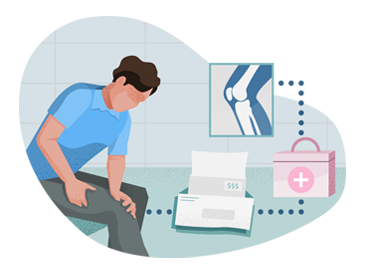How To Get Workers Comp Insurance
Workers' Compensation Insurance
Answer a few questions. Compare personalized quotes. Get covered today.
What kind of work do you do?


We partner with trusted A-rated insurance companies
What is workers' compensation insurance?
- Workers' compensation insurance
-
Workers' compensation insurance covers medical costs and lost wages for work-related injuries and illnesses. This policy is required in almost every state for businesses that have employees.
Protect your dreams
Learn how a workers' comp policy can provide important protection from the unexpected.
Does your small business need workers' compensation insurance?
For almost all businesses in the United States, yes. Workers' compensation insurance usually isn't optional.
While workers' comp laws vary by state, small businesses typically need a policy in place as soon as they hire their first employee.
Even when not required by law, this policy provides important protection against medical expenses and employee lawsuits related to workplace injuries.
You can rely on workers' comp if you or an employee needs medical care or time off due to a workplace injury – or if an injured employee sues you for failing to prevent an accident.
If you don't carry workers' comp, your business will be responsible for any medical bills and legal fees. And most states levy costly penalties for noncompliance.

Small businesses find workers' comp essential for three reasons:
- Most states require workers' comp coverage.
- It covers medical expenses and partial lost wages due to a work injury.
- Most policies also cover the cost of employee lawsuits related to a work injury.
Why is workers' compensation coverage important?
A serious workplace injury could financially devastate your business. Many small businesses can't afford to pay medical bills out of pocket, whether it's treatment for carpal tunnel syndrome or a broken leg.
Without workers' comp coverage, both you and your employees are left in a difficult situation.
Does workers' compensation protect against employee lawsuits?
In many states, yes. Most workers' compensation policies include employer's liability insurance to protect your business if an injured worker files a lawsuit against you for not preventing a workplace accident.
If an employee sues for negligence, your insurance company will pay for:
- Attorney's fees
- Court costs
- Settlements or judgments
Business owners in North Dakota, Ohio, Washington, and Wyoming do not have employer's liability insurance included in workers' comp.
In these states, workers' comp policies are purchased from monopolistic state funds, which do not offer this coverage. Insurance companies sell stop gap coverage to protect you from employee lawsuits.
Does workers' compensation help cover fatal accidents?
Yes, most workers' compensation policies include death benefits. These help a deceased employee's loved ones pay funeral and burial costs after a fatal workplace accident.
Workers' comp can also provide financial assistance for the deceased employee's family.
Does workers' compensation cover employees who contract COVID-19?
It typically depends on where an employee contracted COVID-19 (the coronavirus).
Workers' comp insurance protects employees from on-the-job injuries and illnesses. If an employee contracts the coronavirus while working, then this policy should provide coverage.
For example, a nurse caring for sick patients or a grocery store worker who deals directly with the public would both have a stronger claim than an office worker. Workers' comp doesn't cover diseases unrelated to employment.
Your state's laws could potentially help cover costs related to COVID-19. If you think you might be eligible for a claim, contact your insurance agency's claims department.
How much does workers' compensation insurance cost?

Your cost is based on a number of factors, including:
- Payroll
- Location
- Number of employees
- Industry and risk factors
- Coverage limits
- Claims history
Workers' compensation insurance costs a median of $47 per month. 30% of Insureon's small business customers pay less than $35 per month for this policy.
View Workers' Comp Insurance Costs
Where is workers' compensation insurance required by law?

Do self-employed business owners need workers' compensation insurance?
Typically not by law. States generally require businesses with employees to purchase workers' compensation insurance.
But sole proprietors, independent contractors, and other self-employed business owners may buy this policy to fulfill the terms of a contract or to protect their income.
Most health insurance policies exclude coverage for work-related injuries and illnesses. If you carry workers' comp as an independent contractor, your medical bills will be covered when you're injured on the job.
Workers' comp can also partially replace wages lost while taking time off to recover from a work-related injury.
Learn more about workers' compensation for self-employed workers.
Why do certain clients require you to carry workers' comp?
Your clients don't want to deal with the expense and hassle of a workplace injury. That's why they might require contractors who work for them to carry their own business insurance, including workers' comp.
This requirement limits legal liability for the client. Independent contractors with business insurance are more likely to seek payment from their insurance companies (instead of the client) if they are injured while working on a project.
Want to learn more about this policy? Find answers in our frequently asked questions about workers' compensation insurance.
Compare free workers' comp quotes online
Save money by comparing insurance quotes from multiple carriers.
What kind of work do you do?
How To Get Workers Comp Insurance
Source: https://www.insureon.com/small-business-insurance/workers-compensation
Posted by: johnsgorry1949.blogspot.com

0 Response to "How To Get Workers Comp Insurance"
Post a Comment